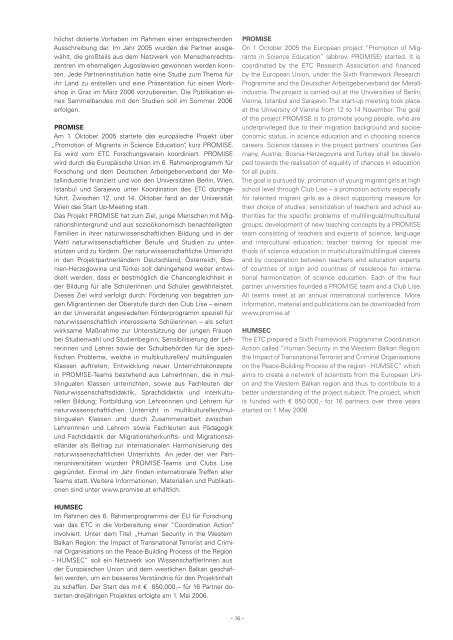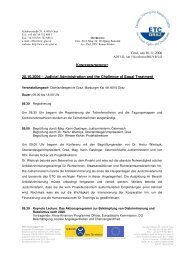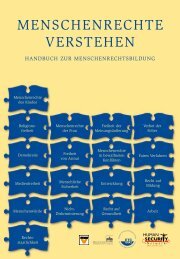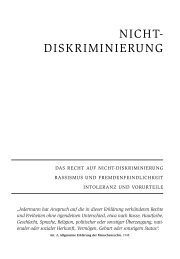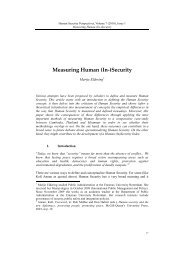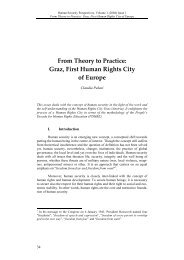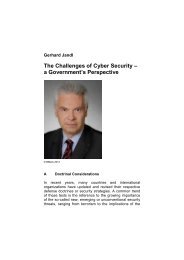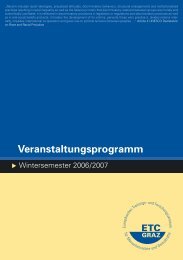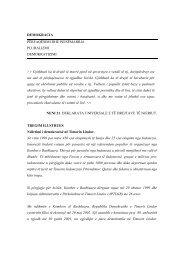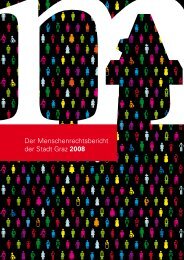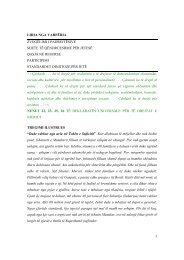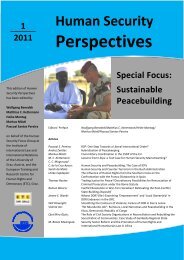deutsch/english - ETC Graz
deutsch/english - ETC Graz
deutsch/english - ETC Graz
- TAGS
- graz
- www.etc-graz.at
Sie wollen auch ein ePaper? Erhöhen Sie die Reichweite Ihrer Titel.
YUMPU macht aus Druck-PDFs automatisch weboptimierte ePaper, die Google liebt.
höchst dotierte Vorhaben im Rahmen einer entsprechenden<br />
Ausschreibung dar. Im Jahr 2005 wurden die Partner ausgewählt,<br />
die großteils aus dem Netzwerk von Menschenrechtszentren<br />
im ehemaligen Jugoslawien gewonnen werden konnten.<br />
Jede Partnerinstitution hatte eine Studie zum Thema für<br />
ihr Land zu erstellen und eine Präsentation für einen Workshop<br />
in <strong>Graz</strong> im März 2006 vorzubereiten. Die Publikation eines<br />
Sammelbandes mit den Studien soll im Sommer 2006<br />
erfolgen.<br />
PROMISE<br />
Am 1. Oktober 2005 startete das europäische Projekt über<br />
„Promotion of Migrants in Science Education”, kurz PROMISE.<br />
Es wird vom <strong>ETC</strong> Forschungsverein koordiniert. PROMISE<br />
wird durch die Europäische Union im 6. Rahmenprogramm für<br />
Forschung und dem Deutschen Arbeitgeberverband der Metallindustrie<br />
finanziert und von den Universitäten Berlin, Wien,<br />
Istanbul und Sarajewo unter Koordination des <strong>ETC</strong> durchgeführt.<br />
Zwischen 12. und 14. Oktober fand an der Universität<br />
Wien das Start Up-Meeting statt.<br />
Das Projekt PROMISE hat zum Ziel, junge Menschen mit Migrationshintergrund<br />
und aus sozioökonomisch benachteiligten<br />
Familien in ihrer naturwissenschaftlichen Bildung und in der<br />
Wahl naturwissenschaftlicher Berufe und Studien zu unterstützen<br />
und zu fördern. Der naturwissenschaftliche Unterricht<br />
in den Projektpartnerländern Deutschland, Österreich, Bosnien-Herzegowina<br />
und Türkei soll dahingehend weiter entwickelt<br />
werden, dass er bestmöglich die Chancengleichheit in<br />
der Bildung für alle Schülerinnen und Schüler gewährleistet.<br />
Dieses Ziel wird verfolgt durch: Förderung von begabten jungen<br />
Migrantinnen der Oberstufe durch den Club Lise – einem<br />
an der Universität angesiedelten Förderprogramm speziell für<br />
naturwissenschaftlich interessierte Schülerinnen – als sofort<br />
wirksame Maßnahme zur Unterstützung der jungen Frauen<br />
bei Studienwahl und Studienbeginn; Sensibilisierung der Lehrerinnen<br />
und Lehrer sowie der Schulbehörden für die spezifischen<br />
Probleme, welche in multikulturellen/ multilingualen<br />
Klassen auftreten; Entwicklung neuer Unterrichtskonzepte<br />
in PROMISE-Teams bestehend aus LehrerInnen, die in multilingualen<br />
Klassen unterrichten, sowie aus Fachleuten der<br />
Naturwissenschaftsdidaktik, Sprachdidaktik und interkulturellen<br />
Bildung; Fortbildung von Lehrerinnen und Lehrern für<br />
naturwissenschaftlichen Unterricht in multikulturellen/multilingualen<br />
Klassen und durch Zusammenarbeit zwischen<br />
Lehrerinnen und Lehrern sowie Fachleuten aus Pädagogik<br />
und Fachdidaktik der Migrationsherkunfts- und Migrationszielländer<br />
als Beitrag zur internationalen Harmonisierung des<br />
naturwissenschaftlichen Unterrichts. An jeder der vier Partneruniversitäten<br />
wurden PROMISE-Teams und Clubs Lise<br />
gegründet. Einmal im Jahr finden internationale Treffen aller<br />
Teams statt. Weitere Informationen, Materialien und Publikationen<br />
sind unter www.promise.at erhältlich.<br />
HUMSEC<br />
Im Rahmen des 6. Rahmenprogramms der EU für Forschung<br />
war das <strong>ETC</strong> in die Vorbereitung einer “Coordination Action”<br />
involviert. Unter dem Titel „Human Security in the Western<br />
Balkan Region: the Impact of Transnational Terrorist and Criminal<br />
Organisations on the Peace-Building Process of the Region<br />
- HUMSEC“ soll ein Netzwerk von WissenschaftlerInnen aus<br />
der Europäischen Union und dem westlichen Balkan geschaffen<br />
werden, um ein besseres Verständnis für den Projektinhalt<br />
zu schaffen. Der Start des mit € 850.000,-- für 16 Partner dotierten<br />
dreijährigen Projektes erfolgte am 1. Mai 2006.<br />
PROMISE<br />
On 1 October 2005 the European project “Promotion of Migrants<br />
in Science Education” (abbrev. PROMISE) started. It is<br />
coordinated by the <strong>ETC</strong> Research Association and financed<br />
by the European Union, under the Sixth Framework Research<br />
Programme and the Deutscher Arbeitgeberverband der Metallindustrie.<br />
The project is carried out at the Universities of Berlin,<br />
Vienna, Istanbul and Sarajevo. The start-up meeting took place<br />
at the University of Vienna from 12 to 14 November. The goal<br />
of the project PROMISE is to promote young people, who are<br />
underprivileged due to their migration background and socioeconomic<br />
status, in science education and in choosing science<br />
careers. Science classes in the project partners’ countries Germany,<br />
Austria, Bosnia-Herzegovina and Turkey shall be developed<br />
towards the realisation of equality of chances in education<br />
for all pupils.<br />
The goal is pursued by: promotion of young migrant girls at high<br />
school level through Club Lise – a promotion activity especially<br />
for talented migrant girls as a direct supporting measure for<br />
their choice of studies; sensitization of teachers and school authorities<br />
for the specific problems of multilingual/multicultural<br />
groups; development of new teaching concepts by a PROMISE<br />
team consisting of teachers and experts of science, language<br />
and intercultural education; teacher training for special methods<br />
of science education in multicultural/multilingual classes<br />
and by cooperation between teachers and education experts<br />
of countries of origin and countries of residence for international<br />
harmonization of science education. Each of the four<br />
partner universities founded a PROMISE team and a Club Lise.<br />
All teams meet at an annual international conference. More<br />
information, material and publications can be downloaded from<br />
www.promise.at<br />
HUMSEC<br />
The <strong>ETC</strong> prepared a Sixth Framework Programme Coordination<br />
Action called “Human Security in the Western Balkan Region:<br />
the Impact of Transnational Terrorist and Criminal Organisations<br />
on the Peace-Building Process of the region - HUMSEC“ which<br />
aims to create a network of scientists from the European Union<br />
and the Western Balkan region and thus to contribute to a<br />
better understanding of the project subject. The project, which<br />
is funded with € 850.000,- for 16 partners over three years<br />
started on 1 May 2006<br />
Internationale Zusammenarbeit<br />
International Cooperation<br />
- 16 - - 17 -<br />
▲ ▲<br />
Europäisches Masterprogramm<br />
für Menschenrechte und Demokratie<br />
Im Sommersemester 2005 ermöglichte das <strong>ETC</strong> die Betreuung<br />
von drei StudentInnen des Venediger Masterprogramms für die<br />
Absolvierung ihres zweiten Semesters in <strong>Graz</strong>. Hanneke Senden<br />
(Niederlande), Mariana Pires Branco Duarte Silva (Portugal)<br />
und Susanna Kupi (Finnland) verschrieben sich ein Semester<br />
lang ihrer Abschlussarbeit sowie den notwendigen Kursen im<br />
Ausmaß von 9 ECTS-Punkten in <strong>Graz</strong>. Betreut wurden sie von<br />
Wolfgang Benedek, Joseph Marko und Richard Sturn sowie<br />
von MitarbeiterInnen des Instituts für Völkerrecht und Internationale<br />
Beziehungen der KFU <strong>Graz</strong> und des <strong>ETC</strong>. Nach Abschluss<br />
des Semesters konnten alle drei Studentinnen ihre Arbeit erfolgreich<br />
bei der Endprüfung in Venedig verteidigen. Die Arbeit<br />
von Hanneke Senden unter dem Titel „Reforming the reforms.<br />
Securing the sustainability of the European Court of Human<br />
Rights“ wurde für die Publikation der besten Arbeiten des Jahrgangs<br />
ausgewählt. Weiters konnte 2005 das Masterprogramm<br />
als Lehrgang an der KFU <strong>Graz</strong> genehmigt werden, die Studienkennzahl<br />
lautet 992 884. Im September 2005 nahm Vizerektorin<br />
Roberta Maierhofer als offizielle Vertreterin der KFU <strong>Graz</strong><br />
an der Diplomverleihung in Venedig teil, wo sie auch die KFU<br />
in ihrer Funktion als diplomverleihende Universität im Rahmen<br />
des European Inter-University Centre Joint Degree vertrat.<br />
Teilnahme an internationalen<br />
Netzwerken<br />
Das <strong>ETC</strong> vertritt die Universität <strong>Graz</strong> im Netzwerk von 39<br />
Universitäten des Europäischen Masterprogramms für Menschenrechte<br />
und Demokratie in Venedig als auch in dem dreizehn<br />
Universitäten umfassenden Netzwerk des Europäischen<br />
Regionalen Masterprogramms in Sarajewo. Darüber hinaus<br />
führt das <strong>ETC</strong> gemeinsam mit dem Menschenrechtszentrum<br />
der Universität Sarajewo ein Netzwerk von universitären Menschenrechtszentren<br />
in Südosteuropa an.<br />
Anlässlich der Jahrestagung der Association of Human Rights<br />
Institutes (AHRI) im Dezember 2005 in Oslo kam es zur Aufnahme<br />
des <strong>ETC</strong> in dieses europaweite Netzwerk von Menschenrechtsinstituten<br />
und –zentren. Neben dem Ludwig-Boltzmann-Institut<br />
für Menschenrechte (BIM) in Wien ist das <strong>ETC</strong><br />
damit der zweite österreichische Partner in diesem Netzwerk.<br />
Weiterhin aktiv ist das <strong>ETC</strong> auch im Rahmen des Netzwerkes<br />
von PDHRE (People’s Movement for Human Rights Education),<br />
als dessen europäischer Partner es derzeit fungiert. Daraus<br />
ergibt sich eine Zusammenarbeit mit Partnern weltweit, insbesondere<br />
im Hinblick auf die Entwicklung neuer Menschenrechtsstädte<br />
und die Kooperation zur Förderung der Menschenrechtsbildung<br />
weltweit.<br />
European Master Programme<br />
on Human Rights and Democracy<br />
In summer semester 2005 the <strong>ETC</strong> facilitated the second semester<br />
for three students from the Venice master programme.<br />
Hanneke Senden (The Netherlands), Mariana Pires Branco Duarte<br />
Silva (Portugal) and Susanna Kupi (Finland) dedicated their<br />
second semester to their theses and their courses of 9 ECTSpoints<br />
in <strong>Graz</strong>. Their theses were supervised by Wolfgang Benedek,<br />
Joseph Marko and Richard Sturn as well as by the <strong>ETC</strong><br />
staff and staff of the Institute for International Law and International<br />
Relations at the University of <strong>Graz</strong>. After the completion<br />
of the second semester in <strong>Graz</strong>, all three students defended<br />
their thesis successfully at the final exams in Venice. The thesis<br />
of Hanneke Senden titled “Reforming the reforms. Securing<br />
the sustainability of the European Court of Human Rights“ was<br />
selected for the publication of the best thesis of the year. Moreover,<br />
in 2005 the master programme was certified by the<br />
University of <strong>Graz</strong> and got a registration number, which is 992<br />
884. In September 2005, Vice-rector Roberta Maierhofer represented<br />
the University of <strong>Graz</strong> at the graduation ceremony,<br />
where she also performed the university’s duty as one of the<br />
awarding universities within the European Inter-University’s<br />
Centre Joint Degree.<br />
Participation in<br />
International Networks<br />
The <strong>ETC</strong> represents the University of <strong>Graz</strong> in the network of<br />
the European Master Programme on Human Rights and Democratisation<br />
in Venice which hosts 39 universities as well as<br />
in the network of the European Regional Master Programme in<br />
Sarajevo which hosts 13 universities. Moreover, together with<br />
the Human Rights Centre of the University of Sarajevo the <strong>ETC</strong><br />
coordinates a network of university human rights centres in<br />
South-Eastern Europe.<br />
On the occasion of the annual meeting of the Association<br />
of Human Rights Institutes (AHRI) in December 2005<br />
in Oslo the <strong>ETC</strong> was accepted as a member of this Europe-wide<br />
network of Human Rights Institutes and Centres.<br />
Next to the Viennese Ludwig-Boltzmann-Institute for Human<br />
Rights the <strong>ETC</strong> is now the second Austrian member<br />
of the network.<br />
The <strong>ETC</strong> is still active within the framework of the PDHRE<br />
(People’s Movement for Human Rights Education), for which it<br />
functions as the European partner. This results in a worldwide<br />
cooperation, especially with regard to the development of new<br />
human rights cities and the cooperation to advance human<br />
rights education worldwide.


